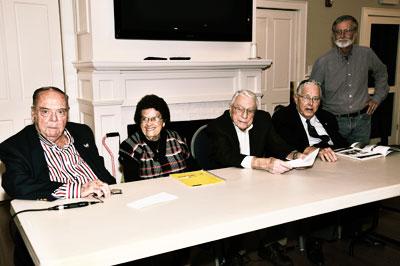Eyewitnesses To ’38 Hurricane’s Destruction

The East Hampton Presbyterian Church’s Session House was full on Friday night as residents came to hear recollections of the Hurricane of 1938 from four who experienced it up close.
The discussion was inspired by the popularity of “The Long Island Express: Rare Photographs of East Hampton Town After the 1938 Hurricane” at the East Hampton Historical Society’s Clinton Academy. Originally slated to conclude on Oct. 8, the exhibit was extended and will now close on Sunday.
Richard Barons, the society’s director, announced that the exhibit was drawing more than 100 people per day. He, along with Hugh King, the town crier, then introduced John Ecker, Norton (Bucket) Daniels, Josephine Crasky, and Donald Halsey as the evening’s panelists.
“What thing do you remember most?” Mr. King asked them.
John Ecker of Montauk, whose family owned Trail’s End restaurant, then situated at the fishing village at Fort Pond Bay, spoke of an enduring memory: “Sitting on chairs and water was up to our knees. We walked through waist-high water to the [Montauk] Manor. The wind was blowing 75, 80 miles per hour.”
Watching the steeple of the Amagansett Presbyterian Church topple, said Ms. Crasky, remains a vivid memory, along with the short but perilous journey home from school, she and her siblings “hanging on, hand in hand,” as her father led them across the street. “Trees were beginning to be uprooted and were falling down. We were all so frightened.”
Mr. Halsey recalled watching men attempt to secure automobiles in his father’s garage, a truck being backed up against one door, a Packard against the other. “Suddenly, the whole back wall collapsed,” he said. He ran to the office to inform his father, who told him to go home. “Many big trees were down,” he said, including one lying atop a crushed Buick.
Mr. Daniels recalled “the velocity and howling of the wind,” and then “a terrible burst of rain. That wind blew for about three hours.”
“We were not aware of any terrible storm coming,” said Ms. Crasky. “There was nothing that gave us any inclination that we would get into this terrific storm-turned-hurricane. There was nothing we could do. It was too late.”
In Montauk, there was some warning, said Mr. Ecker, albeit too late to matter. Employees at the Montauk Manor, which had just closed for the season, would typically come to Trail’s End for lunch. “These were people from Florida who had hurricane experience. When they came down at lunchtime at 11 or 12 o’clock, they said, ‘This looks like a hurricane,’ ” he said.
Residents of the fishing village were fortunate, Mr. Ecker said, that the Montauk Manor was not only nearby and on high ground, but also was mostly vacant. “That’s where we took refuge. We lived up there for a few weeks. Some people lived up there as long as five months or so, before they got their houses cleaned.”
“It was just getting dark when all this happened,” he continued. “There was a slate roof on the Manor. The next morning, when daylight came, you could see pieces of slate driven into the ground. Miraculously, not one person was killed or hurt by that slate coming off the roof.”
There was an upside to the unprecedented damage, the panelists recalled. “It created a little bit of work for people that didn’t have work in the wintertime,” said Ms. Crasky. “The town needed to hire people to clean up this devastated place. That was an opportunity for some people.”
“There was plenty of work,” Mr. Daniels agreed. “Carpenters, painters, electricians, masons, plumbers — they had jobs. The hardware stores, paint stores got busy, the lumberyard sold lumber. People came from the Deep South, from the Midwest, to work. The good times lasted for nearly a year.”
Mr. King asked if there had been animosity toward those people. “No, we welcomed them,” Mr. Halsey replied. “There was so much to do.”
The evening at the Session House, Mr. Barons concluded, “reminds us what villages and towns are like. There’s that sense of community, getting together and trying to clean up afterward, working together.”
From grave danger and unimaginable destruction came an affirmation of community and resolve. Just the same, said Mr. Daniels, “I never want to go through another.”
